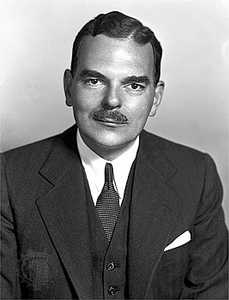Thomas E. Dewey
Thomas Edmund Dewey (b: 24 March 1902; d: 16 March 1971) was the former Republican governor of New York, serving three terms from 1943 to 1955. He was also the Republican presidential candidate on two occasions, losing to the incumbents, President Franklin D Roosevelt in 1944 and to President Harry S Truman in 1948.
In the latter election, he was seen by many as the front-runner. So much so, in fact, that the Chicago Daily Tribune mistakingly ran several hundred copies of their post-election edition with the headline "Dewey Defeats Truman".[1]
Contents
Early Life
Thomas Dewey was born in Owosso, Michigan, on 24th March, 1902. After completing his education at the University of Michigan, he moved to New York and completed his LLB at Columbia University in 1925. After his graduation, he toured England and France, before returning to New York and entering the state bar. In 1928, he married Frances E. Hutt; they had two children.[2]
In 1933 Dewey was appointed as the attorney of the southern district of New York, having been appointed as his predecessor's chief assistant in 1931. At the time, he was the youngest U.S. attorney ever, aged just 31. However, President Roosevelt appointed a Democrat to fill the position just 5 weeks after Dewey took office, which prompted him to return to private law practice.
In 1935, however, he was appointed special prosecutor for the Investigation of Organized Crime in New York and his campaign against narcotics and vice racketeers resulted in 72 convictions in 73 prosecutions. As a result of Dewey's successes, notorious gangster Dutch Schultz planned to have him assassinated. However, rival gangsters, fearful of the potential backlash Dewey's murder would invoke had Schultz killed instead.[3]
In office he earned a reputation for efficiency and honesty and was regarded as a "moderate Republican". In 1937 he was elected district attorney for New York County and was elected Governor of New York in 1942 - a post he was subsequently re-elected to in 1946 and 1950.
Presidential Campaigns
In 1944, Dewey won the Republican presidential nomination to run against the incumbent President Roosevelt. The election took place during the World War II and Dewey had an impossible task against combination of a popular wartime leader and Dewey's own lack of experience in international affairs, and was beaten by 25,602,505 to 12,006,278. [4].
He was the Republican's nomination once again in 1948, this time running against Roosevelt's successor, President Truman. Although - or possibly because - he was the acknowledged front-runner, Dewey waged a non-committal campaign designed to avoid offending any segment of the electorate. He made only a few speeches, avoided controversial issues, and scarcely recognized the opposition. He ultimately lost to Truman by the narrow margin of 24,105,812 to 21,970,065, primarily due to Truman retaining the support of farmers and labour. [5]
Later Life
In 1950 he was elected to his third successive term as New York's governor. He did not stand in the 1952 election, and instead assisted Dwight Eisenhower to win first the Republican Party nomination and then the presidential election.
In 1955, at the end of his third term as governor of New York, Dewey retired from politics and he reentered private practice with the New York firm of Dewey, Ballantine, Bushby, Palmer, and Wood.
By 1957, Dewey had been awarded 16 honorary degrees and had written several books, including "The Case against the New Deal" (1940); "Journey to the Far Pacific" (1952), based on his travels to 17 Pacific countries, a trip suggested by State Department adviser John Foster Dulles; and "Thomas E. Dewey on the Two Party System" (1966).
He died on 16 March, 1971, at Bal Harbour, Florida.
Famous Quotes
- "Ours is an abiding faith in the cause of human freedom. We know it is God's cause."
- "If you're not in New York, you're camping out." [6]
Additional Reading
- Stanley Walker, Dewey: An American of This Century, 1944
- Irwin Ross, The Loneliest Campaign: The Truman Victory of 1948, 1968
- Beyer, Barry K., Thomas E. Dewey, 1937-1947: a study in political leadership, New York: Garland Pub., 1979.
- Smith, Richard Norton, Thomas E. Dewey and his times, New York: Simon and Schuster, 1982.
References
- ↑ The Story Behind the "Dewey Defeats Truman" error
- ↑ "Dewey, Thomas Edmund." The Columbia Electronic Encyclopedia, Sixth Edition. Columbia University Press., 2003
- ↑ "Dewey, Thomas Edmund." West's Encyclopedia of American Law. The Gale Group, Inc, 1998.
- ↑ http://www.spartacus.schoolnet.co.uk/USAdeweyT.htm
- ↑ "Dewey, Thomas Edmund." Britannica Concise Encyclopedia. Encyclopædia Britannica, Inc., 2006.
- ↑ "Dewey, Thomas Edmund." Quotations. Quotations Book, 2008.
